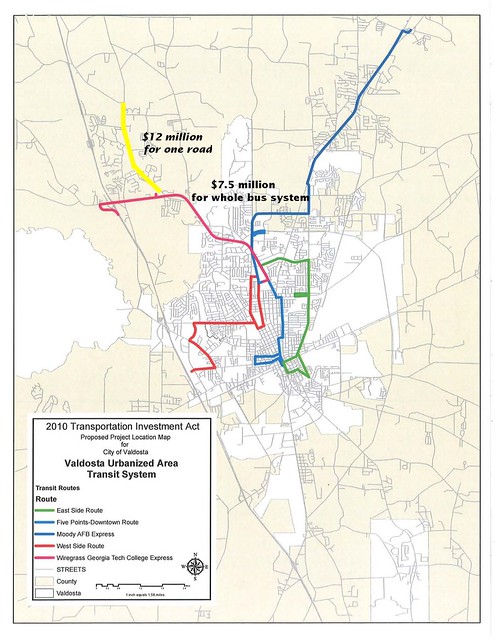Continue readingDate: Wed, 2 Nov 2011 11:17:00 -0400 (EDT)
From: Tom Gooding <chamber@valdostachamber.com>
Subject: Why the Chamber Supports Unification
Dear Chamber Members:Some ask why the Chamber supports school system unification, instead of focusing on poverty. The answer is very simple: The Chamber’s mission is to build a strong and healthy community, resulting in job opportunities for our citizens, which addresses poverty. Improving public education is the single most important thing we can do to build a strong community, grow jobs, and reduce poverty.
Valdosta’s business community consistently ranks
Tag Archives: jobs
To the people of Valdosta and South Georgia —Occupy Valdosta
To the people of Valdosta and South GeorgiaContinue reading
We, the local citizens occupying Valdosta, urge you to assert your power.
Exercise your right to peaceably assemble; to nonviolently occupy public space; to create an open process to address the problems we face, and to generate solutions accessible to everyone.
Our issues are varied, yet related.
We seek
Neighborhoods matter more than schools?
Maureen Downey blogged for AJC 5 October 2011, Forget school vouchers. The route to improving education may be housing vouchers.
I’d say that’s a bad solution to the problem the study identifies, and we already know better solutions. But first, from the abstract of the the study Continue readingSchool voucher proponents argue that kids need a way out of failing schools, but research increasingly suggests that it would be more effective to provide them a way out of failing neighborhoods.
Should we consider giving poor families in low-performing school zones housing vouchers that they could use to relocate in the zone of a school performing above the area median?
Top 10 Reasons Why Solar Energy Will Win
 Greentechsolar has an interesting article 28 Sep 2011 on
Top 10 Reasons Why Renewable Energy Wins.
in which is a top 10 list for solar.
Here are some excerpts:
Greentechsolar has an interesting article 28 Sep 2011 on
Top 10 Reasons Why Renewable Energy Wins.
in which is a top 10 list for solar.
Here are some excerpts:
Why not just say jobs, jobs, jobs? Because solar also doesn’t pollute the air and doesn’t suck up ground water. Not just jobs: clean jobs that don’t drain our resources.
- A job is a job is a job.
With all this talk about green jobs, clean jobs, and other kinds of jobs — how about we just call it a job? A job that puts food on the table, pays the bills, keeps the kids in clothes, and affords the occasional family night out. And, if you subscribe to the belief that all is lost due to the Chinese PV manufacturing juggernaut, keep in mind that you can’t export the thousands of business development, sales, design, engineering, installation, and service jobs we’re going to need every year.
But opinion only matters if the data supports it. Solar is one of the only industries adding private sector jobs in our struggling economy — with 6.8 percent growth from August 2010 to August 2011, when overall U.S. job growth was only 0.7 percent and when fossil fuel generators actually cut jobs by 2 percent. It’s estimated the United States already has over 90,000 direct and indirect jobs in the manufacturing and installation of solar panels. That’s more than in either steel production or coal mining (not including transportation and power plant employment).Yes, while road and bridge building projects may bring in a few temporary construction jobs, solar brings construction jobs plus all sorts of other jobs plus long-term jobs. Long-term jobs in the fastest-growing industry in the world: Continue reading
$12M to widen US 41 N is more than $7.5M for a bus system
One short stretch of road vs. a three-line bus system to connect Wiregrass Tech, Five Points, Downtown, Moody, East Side, South Side, West Side, and the Mall.
Road and bridge proponents usually mutter that a bus system won’t pay back for years, if ever. And that’s right: bus systems usually operate at a loss because local governments subsidize them for the social and economic benefits they bring, such as these:
This project will provide mobility options for all travelers; improve access to employment; and help mitigate congestion and maximize the use of existing infrastructure by promoting high-occupancy travel.Employment, safety, and less sprawl, all from a bus system.
What road and bridge proponents don’t ever mention is: Continue reading
NAACP calls for end to War on Drugs
Interesting how the headline writer watered that down: NAACP called Continue readingIf you grew up at the same time that I did, you’ll remember the “Just Say No” anti-drug campaign that became popular in the mid-1980s and early 1990s.
It manifested itself in many ways, from the posters and talks in class to the “very special episodes” of shows such as “Blossom” and “The Facts of Life,” where a character encounters a kid from the wrong side of the tracks who is pressuring him or her to try drugs. Inevitably, good prevailed and the druggie turned out to be from a broken family and needed only a good face-to-face with Nancy Reagan, the driving force behind the campaign, to overcome his addiction. (She appeared on “Diff’rent Strokes,” and considering the real-life histories of Gary Coleman, Todd Bridges and Dana Plato, she probably should have stuck around for a five-episode story arc.)
“Just Say No” was part of the larger war on drugs the Nixon administration declared in 1971. For grown-ups, that war symbolized a lot more than sappy primetime television. Especially for black adults. For them, it meant stricter laws for those found buying, selling and distributing illegal drugs.
To that end, the NAACP took an interesting step at its national convention last month. It approved a resolution to end the war on drugs because of its devastating effect on the black community.
Job openings at Valdosta and Lowndes County governments
 the city of Valdosta. Here are those
job postings.
the city of Valdosta. Here are those
job postings.
Meanwhile, Lowndes County also has one job opening, under current posted positions.
-jsq
Your children’s education at stake —Sam Allen, FVCS, 7 July 2011
“Are you willing to put your children’s education at stake because somebody has promised you something they can’t deliver? I for one am not willing.”
Here’s the video:
Your children’s education at stake —Sam Allen, FVCS, 7 July 2011
No school consolidation,
Press Conference, Friends of Valdosta City Schools (FVCS),
Valdosta, Lowndes County, Georgia, 7 July 2011.
Videos by John S. Quarterman for LAKE, the Lowndes Area Knowledge Exchange.
-jsq
Private prison operations have been rife with abuse —WV Council of Churches
Dan Heyman wrote 12 January 2010 for Public News Service – WV, Churches: No Private Prison For Immigrants In WV,
CHARLESTON, WV – West Virginia’s largest church group has asked U.S. Sen. Robert Byrd and the rest of the state’s congressional delegation to oppose funding a private prison for undocumented immigrants in Pendleton County near the Virginia border.Continue readingThe Council of Churches is one of several groups discussing immigration reform ahead of expected congressional action on the issue. The Council has asked federal lawmakers’ help in the effort, arguing private prison operations have been rife with abuse. GSI Professional Corrections is seeking county commission approval to build the detention center near Sugar Grove to house 1,000 nonviolent immigrant detainees awaiting possible deportation.
Rev. Dennis Sparks, the Council’s executive director, complains private prisons operate outside the mainstream legal
School consolidation report: can cause irreversible damage
 Craig Howley, Jerry Johnson, Jennifer Petrie wrote 1 February 2011,
Consolidation of Schools and Districts: What the Research Says and What it Means:
Craig Howley, Jerry Johnson, Jennifer Petrie wrote 1 February 2011,
Consolidation of Schools and Districts: What the Research Says and What it Means:
…the review of research evidence detailed in this brief suggests that a century of consolidation has already produced most of the efficiencies obtainable. Research also suggests that impoverished regions in particular often benefit from smaller schools and districts, and they can suffer irreversible damage if consolidation occurs.Isn’t such irreversible damage what Rev. Floyd Rose got Mrs. Ruth Council to admit?
They are referring to black schools before desegregation in the 1960s.Rev. Rose: “…we were told about the world, where we came from, how we got here.”


Mrs. Council: “I think we did receive a better education.”
Rev. Floyd Rose is president of the local SCLC, and here is a statement by Leigh Touchton, president of the local NAACP: Continue reading
